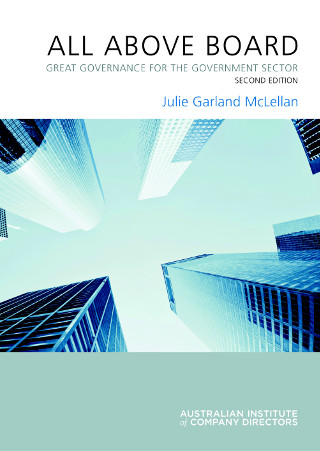|
|
|
|
|
|
|
|
|
Dear reader,
Welcome to the October 2019 edition of The Director's Dilemma. This month our dilemma is based upon the true case of a board that suddenly found the downside of their thrift and the speed with which enabling legislation had been drafted.
During my twenty years' experience serving on, and consulting to, boards I have seen a lot of dilemmas; all can be resolved when there is goodwill, a degree of skill, and a committed hard-working board of directors. Our three contributors have provided a range of ideas for responding to this issue to help your boards to develop their own responses to succession as needs arise. I hope that you enjoy the insights and find them helpful in extending your governance knowledge.
To read this email in a browser, go to www.mclellan.com.au/newsletter.html and click on 'read the latest issue'. I hope you enjoy thinking about the governance and strategic implications of the latest dilemma:
 Paul chairs the board of a government agency that has four other directors. The enabling legislation allows a minimum of five and a maximum of nine directors. The government has expressed a desire not to 'waste' money on a large board. The quorum is half the directors plus one which must be rounded up if it is not a whole number. That is four people; half of five being two and a half, plus one to reach three and a half and rounded up to reach four. Paul chairs the board of a government agency that has four other directors. The enabling legislation allows a minimum of five and a maximum of nine directors. The government has expressed a desire not to 'waste' money on a large board. The quorum is half the directors plus one which must be rounded up if it is not a whole number. That is four people; half of five being two and a half, plus one to reach three and a half and rounded up to reach four.
The directors make every effort to be available and, over the past two years, quorum has not caused any problems.
It is financial year end. The accounts must be signed and recommended to the auditor. They must then be tabled in Parliament and incorporated into the Whole of Government financial accounts. One director has gone overseas and had arranged in advance for leave of absence because she will be trekking in a remote area with little to no internet or mobile phone access. Now the wife of the audit committee chair has called to say that her husband has suffered a stroke and is incapacitated. Paul's only thoughts were to express sympathy and offer any support that he could give.
Now he is in a bind. He can't contact his travelling director and the accounts must be signed off within the next three days or the company will receive an adverse audit finding for late submission of accounts. The government sector has very tight timeframes for finalising the annual accounts and it is always a struggle to get them done on time, however this is the first time that Paul hasn't been able to get a quorum. Not signing off on these accounts could also jeopardise the financial reports for the entire government and will definitely not please the Minister or Treasurer.
What can Paul do?
|
|
|
|
Tony's Answer
 Paul is Chair of a government agency board and as such the legal status and rules for these Boards do not entirely mirror the requirements of Boards of companies formed under the Corporations Act 2001. However, there may be some assistance available under the Corporations Act which could assist Paul address his dilemma. Under s248F of the Corporations Act, unless decided otherwise by the directors, or otherwise specified in the company's constitution, the quorum is two directors. This would enable Paul and the remaining Director to sign off on the Company's financial statements and submit them to the responsible Minister. Paul is Chair of a government agency board and as such the legal status and rules for these Boards do not entirely mirror the requirements of Boards of companies formed under the Corporations Act 2001. However, there may be some assistance available under the Corporations Act which could assist Paul address his dilemma. Under s248F of the Corporations Act, unless decided otherwise by the directors, or otherwise specified in the company's constitution, the quorum is two directors. This would enable Paul and the remaining Director to sign off on the Company's financial statements and submit them to the responsible Minister.
Another possibility would be to use s195 of the Corporations Act and with ASIC approval. Paul could state that there are not enough Directors to form a quorum for a director's meeting and call a general meeting and the general meeting may pass a resolution to deal with the matter.
If these options were not feasible a stark option could be for the government to take control of the composition of a company's board and appoint new directors or remove all, or the majority, of the directors of the Board. Even if this option was open to the government this would take time and may exceed the timelines as well.
In the final analysis, Paul's only option may be to report his dilemma to the Minister and Finance Minister and have the Finance Minister accept the financial statements and to make a statement to the Parliament outlining the dilemma.
What this highlights is the necessity for Paul as Chair to plan ahead for these situations. Having only 5 board directors to draw on means that these situations can occur more so than if there are up to 9 directors available and moving from a quorum of 3 to 5. Obviously, it is difficult to plan for absences caused by illness but if a director is planning to be away on holidays contingency plans need to be devised to avoid this occurrence if and when possible.
Tony Lawson is Chair of Consumers Health Forum of Australia and a Board Member of the Australian Council on Health Care Standards, he is also Executive Director of Laurel Palliative Care Foundation. He is based in Adelaide, South Australia.
|
|
|
|
Julie's Answer

Plan A: Paul should try to establish contact with the director who is trekking and see if there is any time at which she can be available for a meeting to approve the accounts. He has a few days in which to arrange a brief meeting by whatever technology can be made to work if he can reach her and to get the papers to her. This is the simplest way forward.
Plan B: Concurrent with contacting his travelling colleague he should appoint an alternate director to replace the Audit Committee Chair. This is a simple process for a Corporations Act company regulated by ASIC. It is likely not contemplated in his enabling legislation so he should follow the ASIC process.
Paul should let the Minister's office know the situation and his plans to manage it. Ministers like to know when bodies in their portfolio are potentially about to breach a requirement or embark on a course that is not contemplated in their enabling legislation. The Treasurer may also need to be informed.
Finding a director at such short notice is hard. Finding one who can get up to speed and be willing to responsibly sign the annual accounts in that time frame will be even harder. If there is an external audit committee member or a recent former director available, they would be good candidates. Failing that, a person who provides outsourced CFO services might be able to assist, or the government might be able to suggest someone from its register of persons willing to serve on audit committees.
When the crisis has passed, Paul should sit with his Minister and discuss the need for a change in the legislation and/or a larger board to ensure that this does not happen again.
Julie Garland McLellan is a non-executive director and board consultant based in Sydney, Australia.
|
|
|
|
Jana's Answer
 Paul should react on the immediate situation and, at the same time, propose changes in the boards working mode or governance to avoid such an incident in the future. Paul should react on the immediate situation and, at the same time, propose changes in the boards working mode or governance to avoid such an incident in the future.
Doing so, he may convince the authorities he is reporting to that he is able to recognise, manage and anticipate the organization of the approval process and an adverse audit may become unnecessary.
Any superior authority in good faith will certainly take the situation into account.
Paul shall prepare the accounts to be admitted, contact any other member of the audit committee to ask who will approve the accounts in case of the absence or incapacity of their chair.
He shall submit the results to be recommended to the auditor and add the information about the lacking quorum and convince the audit committee to review the results and send them further with a remark on their formal insufficiency.
The report should also contain a deadline for adding the missing signature.
So, the formal mistakes should be recorded but should not hinder the process of forwarding the information to the higher instance.
As for the future, Paul may suggest the measures as to avoid such a situation to be approved by his board and by the Government: no travel before the submission of the closing, a change of the quorum (no Half-persons) or adding a director to the board.
Jana Martinova is Managing Partner of The Accord Group and a long-term board member of the French-Czech chamber of commerce. She is based in Prague, Czech Republic.
|
|
|
|
Book review - All Above Board.

This book is the leading practical manual for government board directors.
There are few environments as challenging as a government owned company boardroom. Often these companies are charged to act in environments where they must balance the needs of stakeholders with the achievement of government policy outcomes and the prudent management of scarce resources. Add to the mix a board of experts, put together by Ministers acting on civil service advice, who may never have worked together before and who may have very different approaches to the strategic challenges, and a heightened public interest from a press that is always keen for stories of misadventure and malfeasance, and you get one of the highest pressure boards a director could wish for.
Understanding how to make strategy in a policy constrained environment, how to achieve progress in a bureaucracy that is geared towards stasis rather than change, and how to provide great governance no matter what happens, is the one thing that unites successful directors across the myriad sectors of government enterprise.
This book provides practical reference and real-life case studies to help boards deliver outstanding results and strong governance.
Available in soft or paperback format through the Australian Institute of Company Directors.
Julie's news - In September
 September was a very busy month with a trip to The Sultanate of Oman for a course on Ethical Leadership in Muscat, several in-house training courses and, of course, my usual board work. September was a very busy month with a trip to The Sultanate of Oman for a course on Ethical Leadership in Muscat, several in-house training courses and, of course, my usual board work.
I attended an excellent AICD Luncheon with guest of honour Linsay Maxsted. Among the topics discussed was the question of taking a corporate stance on a societal issue. Strategically, this is a complex and nuanced decision, that will have a different process and outcome from each unique company and board that contemplates it.
I also attended a PwC not-for-profit board function that concentrated our minds on the subtle differences in the likely application of safe harbour rules to NFP sector companies and their boards.
Some online education sessions were well-received by the clients who had selected this as a way to get a custoomised program of director education for time-poor volunteer directors.
I also enjoyed presenting the second and third modules of the Governance Institute of Australia Effective Director Course in Melbourne. It was a great pleasure to work with my fellow presenters in making the course a success for the many great participants who attended.
I am always keen to work more and will be delighted to hear from you if you would like to arrange a board strategy workshop, education session, or board performance review! Just call me on +61 411 262 470 or reply to this email for a discussion of how I might help your board.
Inspirational quote for October - This month my favourite quote is:

A note on names - A few readers have asked me where I find the names for the protagonists in each case study; I 'borrow' them from people I meet or things that I read. Paul is derived from the Latin 'Paulus' and means 'small' or 'humble'. Our protagonist Paul has certainly been humbled by the events that triggered this dilemma. It is important to remember that, no matter how small or humble your organisation may be, governance is still an important and necessary task that requires a full complement of skills and perspectives in the boardroom. Running at the minimum number of directors allowed in the constitution or enabling legislation may be a risky choice.
This newsletter - If you have any ideas for improving the newsletter please let me know. If you are reading a forwarded copy please visit my website and sign up for your own subscription.
Advertise with us - Do you have something that could benefit the Director's Dilemma community? If so, email me for pricing and advert-placement discounts.
Suggestions for dilemmas - Thank you to all the readers who have suggested dilemmas. They are greatly appreciated. I will answer them all eventually. I could not write this newsletter without your help and without the generous help of all the experts who respond each month to the case studies.
Be a contributor - If you would like to attempt a response to the dilemmas for publication you will be most welcome. Simply reply to this email and let me know.
Let's connect - I use LinkedIn to share information about boards and directorship with my friends and acquaintances. If you use LinkedIn and we are not yet connected I will welcome a connection from you. You can find me at linkedin.com/in/juliegarlandmclellan.
Let me help you - I would be delighted to speak for or train your board, staff, audience and/or group. If I can help please contact me at julie@mclellan.com.au.
Farewell until the next issue (due 1 November 2019). I look forward to greeting you again then. In the interim I hope you will enjoy health, happiness and hard work as well as a lovely holiday.
Enjoy governing your corporations; we are privileged to do what we do!
Best regards,
Julie
Photo Credits: Personal images in this newsletter are provided courtesy of the contributors, course attendees and conference participants.
Disclaimer: The opinions expressed above are general in nature and are designed to help you to develop your judgement as a director. They are not a definitive legal ruling and do not constitute legal advice. Names and some circumstances in the case study have been changed to ensure anonymity. Contributors to this newsletter comment in the context of their own jurisdiction; readers should check their local laws and regulations as they may be very different.
Privacy: I am privileged to have your contact details and keep them as safely as possible. I will alert you if they are ever accessed by any unauthorised person (the technical staff at ayuda help with publishing and issuing the Director's Dilemma and have access so they can send the newsletters to you). I do not sell your details to anyone; they are kept only for the intended purpose - sending you this newsletter and helping to build the judgement of company directors by providing a safe way to consider potential responses to real life events.
|
|
|
|
|
|
|
|
|
|
|
|
|
 Paul chairs the board of a government agency that has four other directors. The enabling legislation allows a minimum of five and a maximum of nine directors. The government has expressed a desire not to 'waste' money on a large board. The quorum is half the directors plus one which must be rounded up if it is not a whole number. That is four people; half of five being two and a half, plus one to reach three and a half and rounded up to reach four.
Paul chairs the board of a government agency that has four other directors. The enabling legislation allows a minimum of five and a maximum of nine directors. The government has expressed a desire not to 'waste' money on a large board. The quorum is half the directors plus one which must be rounded up if it is not a whole number. That is four people; half of five being two and a half, plus one to reach three and a half and rounded up to reach four.
 Paul is Chair of a government agency board and as such the legal status and rules for these Boards do not entirely mirror the requirements of Boards of companies formed under the Corporations Act 2001. However, there may be some assistance available under the Corporations Act which could assist Paul address his dilemma. Under s248F of the Corporations Act, unless decided otherwise by the directors, or otherwise specified in the company's constitution, the quorum is two directors. This would enable Paul and the remaining Director to sign off on the Company's financial statements and submit them to the responsible Minister.
Paul is Chair of a government agency board and as such the legal status and rules for these Boards do not entirely mirror the requirements of Boards of companies formed under the Corporations Act 2001. However, there may be some assistance available under the Corporations Act which could assist Paul address his dilemma. Under s248F of the Corporations Act, unless decided otherwise by the directors, or otherwise specified in the company's constitution, the quorum is two directors. This would enable Paul and the remaining Director to sign off on the Company's financial statements and submit them to the responsible Minister.
 Paul should react on the immediate situation and, at the same time, propose changes in the boards working mode or governance to avoid such an incident in the future.
Paul should react on the immediate situation and, at the same time, propose changes in the boards working mode or governance to avoid such an incident in the future.
 September was a very busy month with a trip to The Sultanate of Oman for a course on Ethical Leadership in Muscat, several in-house training courses and, of course, my usual board work.
September was a very busy month with a trip to The Sultanate of Oman for a course on Ethical Leadership in Muscat, several in-house training courses and, of course, my usual board work.
